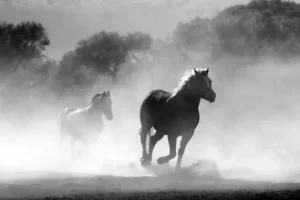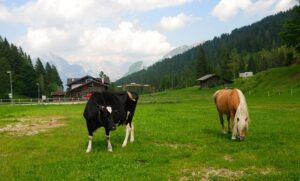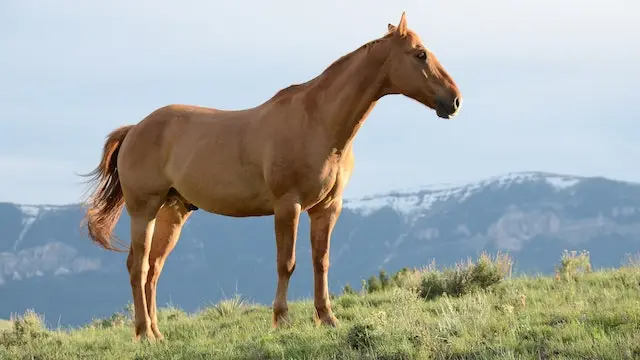
Mares are lovely animals, but if you are a mare owner reading this right now, chances are you have had some difficulty with your little girl at some times when she is in heat.
And chances are, this had happened when you were least prepared for it. Yes, it would be good to know a little about a mare’s cycles, and more so if you are a mare owner so the next time, you will be better able to deal with and also manage the situation more empathetically now that you know all about a mare in heat.
But first things first, and so with that, here are addressing one of the first questions on your mind, which is “How often do mares go into heat.”
How Often Do Mares Go Into Heat?
Mares go into heat during the breeding season, which is spring and summer. This could last for a period of 5 to 7 days after 21 days of ovulation.
Mares, in other words, have short heat cycles, and this is something to be dealt with regularly, but only in the months of spring and summer, so don’t worry.
However, there are some times when you may notice that a mare is constantly in heat, which sadly may not be a very good thing. This is because constant heat in a mare could sometimes be an indication of issues like tumors in the body or any other infection.
Also, if you find that your mare is constantly going into heat, it could be time to visit her at the vet.
How Many Times A Year Do Mares Go Into Heat?
The season lasts somewhere between March to September. At this time, mares come into season, with a series of cycles responsible for their going through heat.
Hence, we can gauge that mares go into heat a little more than a couple of times a year. It is in the winter months that they remain sexually inactive. There are two alternative phases here. First, there is the heat period, which you call oestrus, and then there is the rejection, called the introitus.
Now, this is a process that gets repeated every three weeks, leaving out the winter. This is because, in the winter, a mare is not exposed to the required amount of heat to put her in heat. The lack of daylight here becomes responsible for the lack of heat.
Summers, however, are when the days are longer, so the heat is greater. So when light increases, a mare’s heat increases. That is how simple it is.
Read more: How Long Can A Horse Go Without Water?
What Happens To A Mare’s Body In Heat?
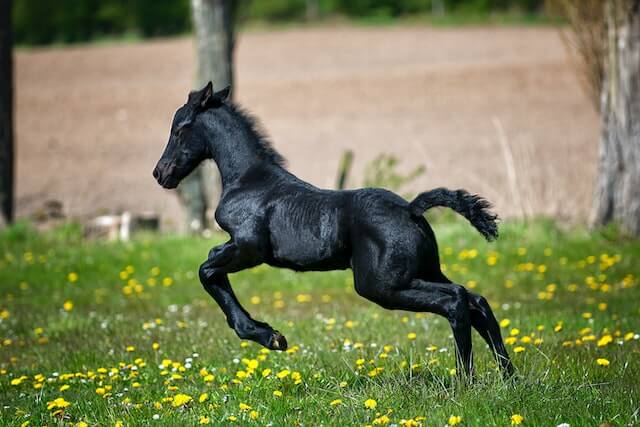
To put it in scientific terms, the mare is going through what you call estrus, and this is the time when her body is getting prepared for a baby, just as it is in the case of humans.
It would be good to have a little more understanding of a mare’s estrous cycle, which can be a time-consuming job where an owner will have to pay some attention to observing the mare’s behavior.
This is often known as teasing, and while there are professionals trained to do it, it would also be good for a mare owner to educate himself with some basic knowledge of it.
During this time, a mare is most fertile between the ages of 6 and 7. At this time, the pituitary gland is situated at the base of a mare’s brain, is the most active, and releases the needed hormone into its bloodstream.
This is the follicle-stimulating hormone that travels all the way to the mare’s ovaries, leading to the development of the follicle or cavity. Eggs are contained in this cavity. And as the follicle grows, estrogen gets produced.
Confusing? Well, it’s fine; you don’t have to understand the whole thing.
Here’s what happens next. The estrogen that gets produced further produces a second hormone. This is known as the luteinizing hormone, and it is this hormone that is known to trigger the process of ovulation.
It is at this point that the follicle ruptures to send the egg into the fallopian tube. And so, while all this happens in her body, the mare remains in heat.
What Does A Mare In Heat Look Like?
She is going to get sensitive and nervous, which is obvious considering that she is in heat. In other words, she is going to neigh more often, so yes, expect a lot of noise at this time, for she is only trying to share her feelings with you.
And if you are a lover of horses (which you sure are), you will find that cute, for the following are some of the things you will get to see
A mare at this time will thus sniff, lick, and nuzzle a stallion that approaches her. A stallion will, at such times, tease her in order to test her. A mare that urinates is a mare that is ready.
She will also squat and wink a lot in the process. If you try to ride on her now, chances are she will show signs of irritability.
How Do You Know When A Mare Is In Heat?
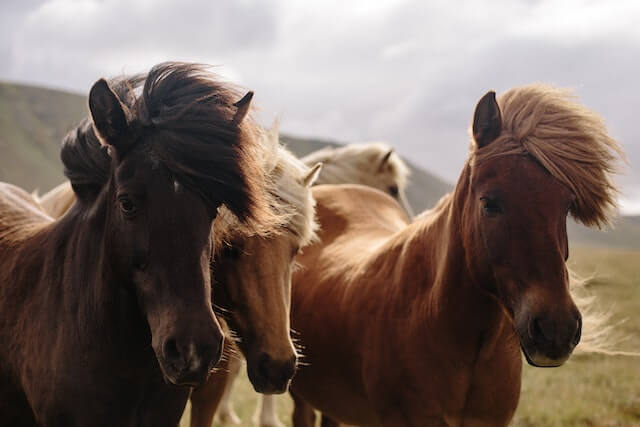
You will notice the way she is acting. She is going to swish her tail more often, and yes, this can be very frustrating. A mare, at this time, may even lift her tail and place it on one side.
And apart from that, she is going to pee every ten yards, and all this can come in the way of your trial practice.
But now that you know why this is happening, remember to be patient, for she deserves that little bit, doesn’t she?
There are also a lot of physical discomforts that happen in the process, which should explain the aggression that you see.
Some mares, on the other hand, may even experience what is known as colic, which is another reason for their irritability.
And so, most mares, at this time, will go camping. This means that her legs will freeze, and she is going to spread her back legs. What follows from there is a yellowish-white discharge which is going to drop from between her legs.
And it is at this time that a mare needs to be bred so that she can conceive. This is the time she will respond best to a stallion, and her chances of conception are high.
Are Mares Moody When In Heat?
Noticed some mood swings, have you? Your guess is right. This can be a result of your mare going in the heat. Sometimes, this can even reach the extent of the mare being aggressive, but remember to show some sympathy now that you know.
When a mare is in heat, her hormones fluctuate. One way in which an owner can deal with this is by providing the mare with some herbal supplements that can serve as an effective therapy.
Some other supplements that are proven to be very effective at a time like this are chamomile or even lemon balm. All these can serve as anti-inflammatories and will, in the long run, help a mare deal better with the heat.
You can keep track of your mare’s cycle in order to administer this effectively. This way, your mare will be better able to manage her mood swings.
Some say that raspberries are a good supplement source for mares going through mood swings. All these can greatly help and improve a mare’s temperament and, at the same time, maintain her consistency by way of training so an owner can use her to at this time in practicing for his competition.
Must Read: Can Horses Have Beer?
Do Mares Stop Going Into Heat Altogether?
Unlike humans, mares do not go through menopause. In other words, there is no full stop for a mare going through periods of heat.
However, what does happen as the mare ages is that her frequency of going into heat is going to reduce and get lesser, which means a mare in her old days will not be going through as many periods of heat as she did when she was young.
In other words, a mare merely goes through reduced fertility as she advances in age. However, their period of heat may last longer in time.
Cessation, on the other hand, is something rare that occurs only in very few mares.
Wrap-Up on How Often Do Mares Go Into Heat
The exact length and frequency of estrus are variable, influenced by factors like age, reproductive status, and environment. While mares regularly cycle and show heat during the breeding months, they generally do not exhibit strong signs of estrus or ovulate during the non-breeding season in fall and winter.
And with that, you now know all about your mare, her heat cycles, and the things that she goes through when in heat. And so, here’s hoping for a better relationship between your mare and you as you stand by her the next time you know she is going through a heat period.

